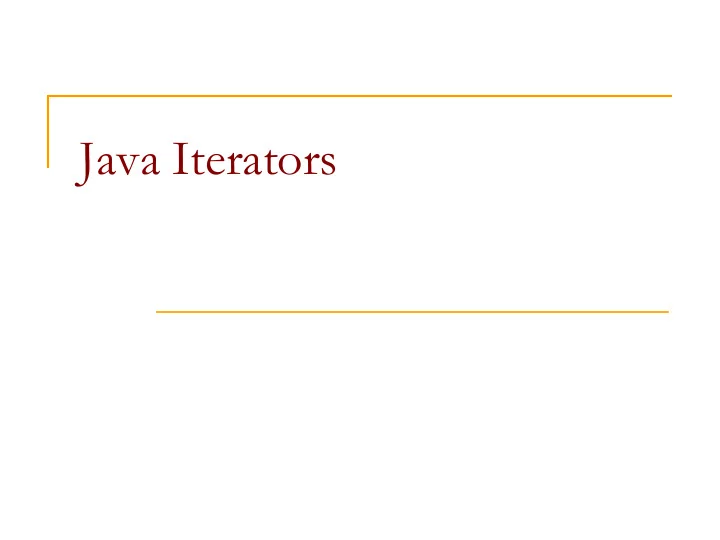

Java Iterators
Motivation n We often want to access every item in a collection of items q We call this traversing or iterating q Example: array for (int i = 0; i < array.length; i++) /* do something with array[i] */ q Easy because we know exactly how an array works!
Motivation n What if we want to traverse an arbitrary collection of objects? q Its underlying implementation may not be known to us n Java provides an interface for stepping through all elements in any collection, called an iterator
Iterating through an ArrayList n Iterating through an ArrayList of Strings: for (int i = 0; i < list.size(); i++) { � String s = list.get(i); � //do something with s � } � n Alternative : Iterator<String> itr = list.iterator(); � while (itr.hasNext()) { � String s = list.next(); � } � This syntax of iteration is generic and applies to any Java class that implements the Iterator interface. � � �
Iterating through an ArrayList n Iterating through an ArrayList of Strings: for (int i = 0; i < list.size(); i++) { � String s = list.get(i); � //do something with s � } � n Alternative : Iterator<String> itr = list.iterator(); � while (itr.hasNext()) { � String s = list.next(); � } � Advantage of the alternative: the code will work even if we decide to store the data in a different data structure (as long as it provides an iterator) � �
The Java Iterator Interface n Iterator<T>: a generic interface with the following methods q public boolean hasNext(); returns true if there are more elements to iterate over q public T next(); returns the next element q public void remove(); removes the last element returned by the iterator ( optional operation ) n It is in the java.util package n Which Java class that you know implement this interface?
The Java Iterator Interface q public boolean hasNext(); returns true if there are more elements to iterate over q public T next(); returns the next element throws a NoSuchElement exception if a next element does not exist q public void remove(); removes the last element returned by the iterator optional operation : if you choose not to implement it, the method needs to throw an UnsupportedOperationException
The Java Iterator Interface public interface Iterator<E> { /** Returns the next element. Throws a NoSuchElementException if there is no next element. **/ public E next (); /** Returns true if there is a next element to return. */ public boolean hasNext (); /** Removes the last element that was returned by next. Throws an UnsupportedOperationException if the remove method is not supported by this Iterator. Throws an IllegalStateException if the next method has not yet been called or if the remove method has already been called after the last call to the next method. */ public void remove (); }
Using an iterator ArrayIterator<Integer> itr = new ArrayIterator<Integer>(array); while (itr.hasNext()){ Integer element = itr.next(); }
Example: an array iterator public class ArrayIterator<T> implements Iterator<T> { private int current; private T[] array; public ArrayIterator (T [] array){ this.array = array; this.current = 0; } public boolean hasNext (){ return (current < array.length); } public T next (){ if (!hasNext()) throw new NoSuchElementException(); current++; return array[current - 1]; } }
The Iterable interface Given an ArrayList we can traverse it using an iterator: � Iterator<String> itr = list.iterator(); � while (itr.hasNext()) { � String s = list.next(); � } � Or using the foreach form of the for loop: � for (String s : list) { � //do something with s � } � � The latter is possible because an ArrayList is iterable.
The Iterable interface n The Java API has a generic interface called Iterable<T> that allows an object to be the target of a “foreach” statement q public Iterator<T> iterator(); returns an iterator n Why do we need Iterable ? q An Iterator can only be used once, Iterables can be the subject of “foreach” multiple times.
public class MyArrayList implements Iterable { private Object [] array; // not shown: constructors and add/remove etc. public Iterator iterator() { Iterator itr = new ArrayIterator(); return itr; } private class ArrayIterator implements Iterator { int current; public ArrayIterator (){ this.current = 0; } public boolean hasNext(){ return (current < array.length); } public Object next() { if (!hasNext()) throw new NoSuchElementException(); current++; return array[current - 1]; } } }
Inner classes n Inner class : defined inside another class n If declared private it can’t be used by other classes n The methods of the inner and outer classes have access to each other’s methods and instance variables, even if declared private.
Why use Iterators? n Traversing through the elements of a collection is very common in programming, and iterators provide a uniform way of doing so. n Advantage? Using an iterator, we don’t need to know how the data structure is implemented!
Recommend
More recommend